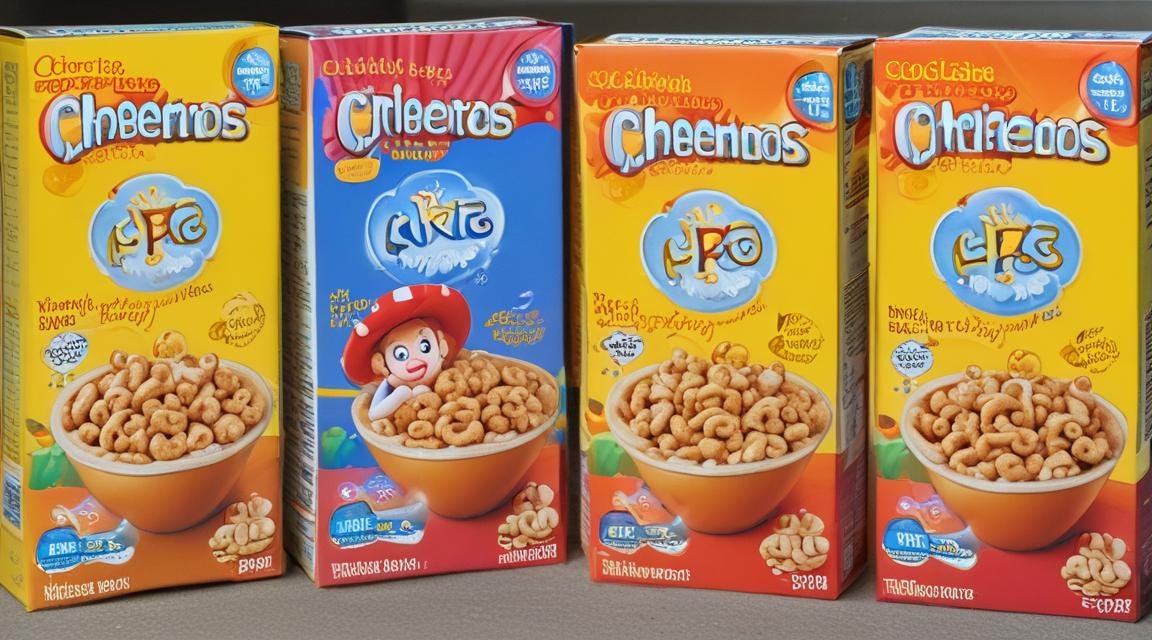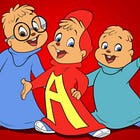De Do Do Do De Da Da Da
Gibberishness as Earworms, Pt. 2: The Rock Songs. Five made-up lyric tracks I love.
It’s family lore that my first spoken word when I was 11 months old was “Cheerios.”
As much as I want to believe I was verbalizing three-syllable words before the age of one, I would later discover that what I had said at the time (probably mumbled through a mouth filled with soggy Cheerios) was “Dodies.”
While it seems possible that my first non-cry, non-whine utterance would consist of two syllables — I was a brilliant baby from all accounts — I still don’t get the translation from “Dodies” to “Cheerios.”
Sure, I was raised on General Mills products — Bisquick, Cocoa Puffs, Yoplait — but as far as I can tell, our family did not earn any company kickbacks. I could never get a straight answer from my mom whenever I asked her about the Dodies/Cheerios conundrum.
“The only food you would eat at the time was Cheerios, so that’s what we fed you.” Clearly, nutrition was a low priority back in the late 60’s. When I prodded her again about Dodies, she rolled her eyes and said, as if it were obvious: “What else could Dodies have meant?”
I didn’t take the opportunity to list a dozen possible items that Dodies could have been (adding a second ‘o’ would have provided an obvious answer). The “ch” sound was clearly too advanced for my three-toothed, infant mouth.
Cheerios seemed the likely translation.
As the 1960s led to the 1970s, I would eventually expand my vocabulary, adding in such phrases as “Honey Nut Dodies,” “Apple Cinnamon Dodies,” and “Frosted Dodies.” If my life were a TV show, it would be cerealized.
Gibberishness is what we call made-up words, especially those coming from the mouths of babes. But what about from the mouths of adults? And, more specifically, adult musicians?
As a perpetual toddler, my love of made-up words, aka gibberishness, has not lessened one bit. Thankfully, rock ‘n’ roll is filled with plenty of artists who feel the same way I do.
Below are 5 of my favorite gibberish earworm songs throughout rock history.
I’d love to know in the comments which gibberish songs are earworms for you. I’ll share a playlist of our favorites in an upcoming post!
Note: I didn’t include any songs from two great bands who often sung in their own made up language. I’m referring to Cocteau Twins and Dead Can Dance. This was a tough choice, leaving them out, but as much as I love both artists, I can’t say that any of their songs have been earworms for me. Maybe one of you could suggest a tune from either band that might be stickier than I remember.
1. De Do Do Do, De Da Da Da — The Police
Is this 1980 hit single by The Police (from the great Zenyatta Mondatta album) the first song you thought of when I mentioned the topic? It was for me, though it wasn’t until putting this post together that I knew the background of this song’s gibberishness.
According to lead singer Sting, the song is about the attraction that people have to simple songs.[3] Sting later criticized those who labeled the song's lyrics as "baby talk.” He explained, "The lyrics are about banality, about the abuse of words," saying that "the lyrics have an internal logic."
I was trying to make an intellectual point about how the simple can be so powerful. Why are our favourite songs 'Da Doo Ron Ron' and 'Do Wah Diddy Diddy'? In the song, I tried to address that issue. But everyone said, 'This is bullshit, child's play.' No one listened to the lyrics. Listen to the lyrics. I'm going to remake it again and put more emphasis on what I was talking about.
— Sting, Rolling Stone, 2/1988[3]
Okay, Boomer.
When you read the following words, do you immediately know what song they are from?
Cow cow hoo-oo
Cow cow wanna dib-a-doo
Chicken hon-a-chick-a-chick hole-a-hubba
Hey fried chuck-a-lucka wanna jubba
Hi-low nay wanna dubba hubba
Day down sum wanna jigga-wah
Dell rown ay wanna lubba hubba
Mull an' a mound chicka lubba hubba
Fay down ah wanna dippa-zippa-dippa
If you are a Wormhead of a certain age, I would guess there’s a 50 percent chance you recognize this song. And if you don’t, the following video will cause you to slap your forehead and call out: “oh yeah!”
2. Rubber Biscuit (The Chips/Blues Brothers)
Like most of the The Blues Brothers’ oeuvre, they did not write “Rubber Biscuit.” That honor would go to The Chips. The Chips were a short-lived New York doo-wop vocal group consisting of teenage friends Charles Johnson (lead vocal), Nathaniel Epps (baritone), Paul Fulton (bass), Sammy Strain and Shedrick Lincoln (tenors). They recorded “Rubber Biscuit” as a single in 1956, but unfortunately broke up in 1957, and the song, though popular on east coast radio, did not chart, and was more or less forgotten until Martin Scorsese resurrected it for his film Mean Streets in 1973.
In The Blues Brothers’ version, Dan Ackroyd sings multiple voices from The Chips original, bringing his special charm to the speedy delivery.
In last week’s post, I explored the role of gibberish lyrics in children’s songs and musicals. I used examples such as “Supercalifragilisticexpialidocious” from Mary Poppins, “Tikki Tikki Tembo,” the children’s book and song, and “Witch Doctor,” originally written and performed by Ross Bagdasarian, but made famous by Alvin and the Chipmunks. You can read that piece here:
3. Da Da Da — Trio
As a teen in the early ‘80s, and with the advent of MTV, I, along with millions of other young people, became a big fan of Trio’s Dadaistic 1982 hit single “Da Da Da.”
Since I don’t speak German, I had to look up whether Da Da Da was, in fact, gibberish or a clearly understood statement along the lines of Yes Yes Yes, or Perhaps Perhaps Perhaps.
According to Beatcrave.com, “Da Da Da” is a song about the complexities of communication in relationships. The repetition of “da da da” represents the difficulty of expressing oneself, indicating that words are often inadequate for conveying the truth.
I also looked up the definition of “Da” in German and, like many other words, it has several meanings and usages. Trying to understand these meanings and usages made me want to nap, so that’s what I did. When I woke up, I was still no wiser. In short, “da” can be both a conjunction and an adverb. Some conjunction translations might be: because or since. The adverb examples they give are: related to temporal meaning and spatial location (now, there).
That’s more than I had intended to say about this, but if you would like to know more, click this link.
Around the same time, Nena’s “99 Luftballons” and Falco’s “Der Kommissar,” became international hit singles, both in their native German as well as in English (with British band After the Fire performing the English version of “Der Kommisar”). This trend continued with Trio’s “Da Da Da,” where both English and French versions would chart following the unexpected success of the original.
If you are younger than 40, you may recognize this song from its use in a viral Volkswagen Golf television commercial in 1997.
4. MMMBop — Hanson
Hanson’s “MMMBop” is the most current of the picks here. It’s also the biggest hit by far of the five entries. And deservedly so! This 1997 single from Hanson’s debut album, Middle of Nowhere, reached #1 in more than 12 countries.
Listening to it again, I’m amazed at how well it holds up, almost 30 years later. They are the generational sibling pop connection between The Jackson Five and Haim. You heard it here first.
This factoid from Wikipedia really blew my mind:
“MMMBop” was voted the best single of the year in The Village Voice Pazz & Jop critics poll while also topping critics' polls from such media as Rolling Stone, Spin, and VH1.
The gibberishness here is aligned with the soul songs of the ‘50s and ‘60s, the whole “Do Wa Ditty Ditty” style, but with more of a pop flavor.
Whatever it is, it’s a bop. An MMMBop. And a genuine earworm.
5. Thela Hun Ginjeet — King Crimson
I had to include King Crimson’s “Thela Hun Ginjeet” (Discipline, 1981) not only because it’s a fantastic song by four of the best musicians in rock history but also because I’m seeing half of the band’s original members in concert tonight (if you are reading this on the day that this posted, Sept. 12), under the moniker, BEAT.
BEAT will be performing the music of King Crimson during their unique early-80s period, when guitarist/vocalist Adrian Belew, guitarist Robert Fripp, bassist Tony Levin, and drummer Bill Bruford, released three acclaimed yet divisive albums (Discipline, Beat, and Three of a Perfect Pair) with that monster lineup.
Bruford has retired from the music biz, and Fripp wasn’t interested in touring. But he gave his blessing and encouragement to Belew and Levin, who recruited guitarist Steve Vai and drummer Danny Carey (Tool) to fill in.
I am a big fan of the vast discography of King Crimson, but it’s their early ‘80s era that I adore the most. So I’m especially excited for this concert.
I’ll let you know my thoughts on the show in a future post.
“Thela Hun Ginjeet,” is based on a real event that happened to Adrian Belew while tape recording cityscape sounds in London. Walking around Notting Hill Gate, he was approached by some men with ill intent. He escaped this situation unharmed but was later harassed by police. Belew used these incidents as inspiration for the song.
“Thela Hun Ginjeet” is an anagram for “Heat in the jungle,” which is how Belew described this tense situation.
The music has a frenetic, polyrhythmic propulsion that evokes a jittery and nervous tension, inspiring listeners to move their bodies. (It’s one of the few Crimson songs in 4/4 rhythm, and thus danceable.)
What is a favorite gibberish song of yours that I left out? Let me know in the comments.
Are there songs that you thought were gibberish but you later found out were actual words?
Thanks, as always, for reading and supporting EW@SL!
Steve











I completely forgot about Parliament Funkadelic/George Clinton! This one for sure will go on the playlist. There’s a lot of concocted words in the Clintonverse.
https://youtu.be/Q1Y-XZ3Jl5Q?si=5ly0bCxmKhSHQvk-
"De Do Do Do" annoys me because of the lyric, "And when their eloquence escapes you / Their logic ties you up and rapes you!" It seems a little much.
I'll mention the parody song from Red Dwarf: https://reddwarf.fandom.com/wiki/Tongue_Tied